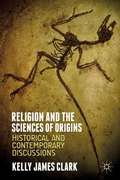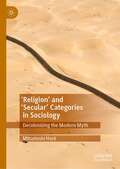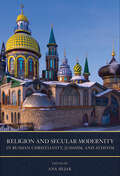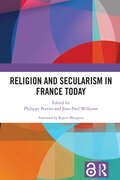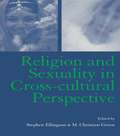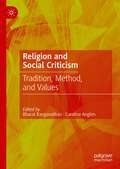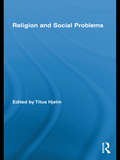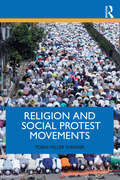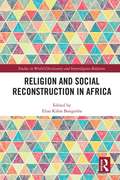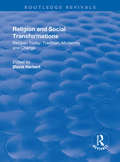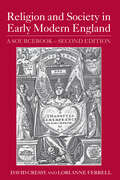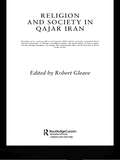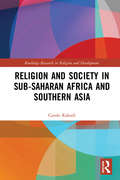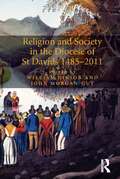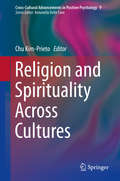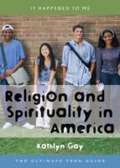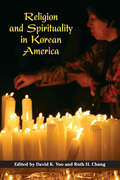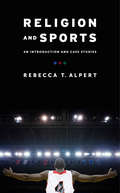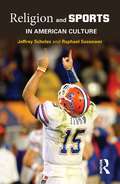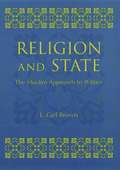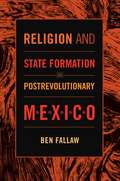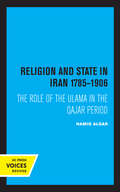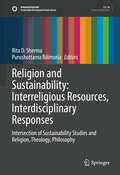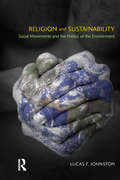- Table View
- List View
Religion And The Sciences Of Origins
by Kelly James ClarkThis concise introduction to science and religion focuses on Christianity and modern Western science (the epicenter of issues in science and religion in the West) with a concluding chapter on Muslim and Jewish Science and Religion. This book also invites the reader into the relevant literature with ample quotations from original texts.
'Religion’ and ‘Secular’ Categories in Sociology: Decolonizing the Modern Myth
by Mitsutoshi HoriiInformed by ‘critical religion’ perspective in Religious Studies and postcolonial self-reflection in Sociology, this book interrogates the ideas of ‘religion’ and ‘the secular’ in social theory and Sociology. It argues that as long as social theory and sociological discourse embed the religion-secular distinction and locate themselves on the ‘secular’ side of the binary, Sociology will continue to serve the very ideologies it tries to subvert – namely Western modernity/coloniality.
Religion and Secular Modernity in Russian Christianity, Judaism, and Atheism (NIU Series in Slavic, East European, and Eurasian Studies)
by Edited by Ana SiljakReligion and Secular Modernity in Russian Christianity, Judaism, and Atheism is a multifaceted account of the engagement between religion and the secular in Russia's Christian, Jewish, and atheist traditions. Ana Siljak brings together an interdisciplinary group of leading scholars to present unique perspectives on the secularization dynamic in Russia and the Soviet Union, telling stories about theologians, sects, churches, poets, and artists. From the Jewish Christian priest Alexander Men, to the cross-dressing poet Zinaida Gippius, to the Soviet promoter of Yiddish theater Solomon Mikhoels, Religion and Secular Modernity in Russian Christianity, Judaism, and Atheism gives a voice to a variety of actors who have grappled with the possibilities of faith and unbelief in an industrialized, modern, and seemingly secular world. Now more than ever, as one narrative of Russia's religious history dominates official Russian accounts, alternative perspectives of the relationship between Russian religion and secularism should be highlighted and emphasized.
Religion and Secularism in France Today
by Philippe Portier Jean-Paul WillaimeThis volume explores the dynamic life of religion and politics in France. The separation of church and state and the autonomy of school education from religion are the two fundamental pillars of France as a secular republic. The historical construction of French secularism (laïcité) was particularly marked by the strong opposition between the state and the Catholic church. However, the religious disaffiliation of a significant proportion of the French strengthened state secularism, which gradually became more consensual – despite some persisting tensions in the school context. Yet, in the last decades, several factors have revived public debate on laicity: the quarrel over ‘sects’ and new religious movements; controversies over Islam, today the second-largest religion in France; and, more recently, dispute over bioethics. Faced with these challenges, laicity as well as the religious groups involved have been changing. The authors of this book, ranking amongst the best French experts in the study of religion and secularism, introduce the reader to a living and lived laicity influenced by the social and religious dynamics of contemporary France. They demonstrate that the configurations of French secularism are both more flexible and complex than they appear to be. The volume investigates the extent to which the French idea of secularization has been pushed to be more thorough and radical in its interaction with its other European counterparts. A key work on French political thought, this volume will be of great interest to scholars and researchers of international politics, political philosophy, political sociology, and religion and politics.
Religion and Sexuality in Cross-Cultural Perspective
by Stephen Ellingson M. Christian GreenIssues of sexuality and gender are hotly contested in both religious communities and national cultures around the world. In the social sciences, religious traditions are often depicted as inherently conservative or even reactionary in their commitments to powerful patriarchal and pronatalist sexual norms and gender categories. In illuminating the practices of religious traditions in various cultures, these essays expose the diversity of religious rituals and mythologies pertaining to sexuality. In the process the contributors challenge conventional notions of what is normative in our sexual lives.
Religion and Social Criticism: Tradition, Method, and Values
by Bharat Ranganathan Caroline AnglimThis volume brings together emerging and established religious ethicists to investigate how those in the field carry forward the practice and tradition of social criticism and, at the same time, how social criticism informs the scholarly values of their field. Contributors reflect on the nature of the moral subject and the ethical weight of human dignity and consider the limits and possibilities of religious humanism in orienting the work of social criticism. They compare religious sources and forms of research in religious ethics to secular sources and the tradition of liberal social criticism. And they offer proposals for how religious ethics can help humanists navigate our complex and multicultural moral landscape and what this field reveals about the ultimate ends of humanistic scholarship.
Religion and Social Problems (Routledge Advances in Sociology)
by Titus HjelmAlthough students and scholars of social problems have often acknowledged the role of religion, no thorough examinations of the relation between the two have emerged. This volume fills this gap by providing a definitive work on the role of religion in assessing, constructing, and solving social problems. Contributors chart the relation between religion and social problems, exploring such case studies as the impact of religion on drugs and alcohol use among Muslims, the rising importance that religion is given in social policy, the role of the Orthodox and Catholic churches in tackling social problems in post-communist East Europe, and the contested role of religion in the national and international politics of contemporary Japan. Religion and Social Problems is a broad and path-breaking contribution to the fields of sociology of religion, sociology of social problems, and religious studies.
Religion and Social Protest Movements
by Tobin Miller ShearerWhat role has religion played in social protest movements? This important book examines how activists have used religious resources such as liturgy, prayer, song and vestments with a focus on the following global case studies: The mid-twentieth century US civil rights movement. The late twentieth century antiabortion movement in the United States of America. The early twenty-first century water protectors’ movement at Standing Rock, North Dakota. Indian independence led by Mohandas Gandhi in the early 1930s. The Polish Solidarity movement of the 1980s. The South African anti-apartheid movement of the 1980s and 1990s. Prayer as a sacred act is usually associated with piety and pacifism; however, it can be argued that those who pray in public while protesting are more likely to encounter violence. Drawing on journalistic accounts, participant reflections, and secondary literature, Religion and Social Protest Movements offers both historical and theoretical perspectives on the persistent correlation of the use of public prayer with an increase in conflict and violence. This book is an important read for students and researchers in history and religious studies, and those in related fields such as sociology, African-American studies, and Native American studies.
Religion and Social Reconstruction in Africa (Studies in World Christianity and Interreligious Relations)
by Elias Kifon BongmbaReligion has played a major role in both the division and unification of peoples and countries within Africa. Its capacity to cause, and to heal, societal rifts has been well documented. This book addresses this powerful societal force, and explores the implications of a theology of reconstruction, most notably articulated by Jesse Mugambi. This way of thinking seeks to build on liberation theology, aiming to encourage the rebuilding of African society on its own terms. An international panel of contributors bring an interdisciplinary perspective to the issues around reconstructing the religious elements of African society. Looking at issues of reconciliation, postcolonialism and indigenous spirituality, among others, they show that Mugambi’s cultural and theological insight has the potential to revolutionise the way people in Africa address this issue. This is a fascinating exploration of the religious facets of African life. As such, it will be of great interest to scholars of religious studies, theology and African studies.
Religion and Social Transformations: Volume 2
by David HerbertThis title was first published in 2002: Religion and Social Transformations examines the reciprocal relationship between religion, modernity and social change. The book focuses on the world's three major missionary religions - Buddhism, Christianity and Islam. It explores how these three traditions are responding to some of the most challenging issues associated with globalization, including the role of religion in the fall of Communism; the tension between religion and feminism; the compatibility of religion and human rights; and whether ancient religions can accommodate new challenges such as environmentalism. The five textbooks and Reader that make up the Religion Today Open University/Ashgate series are: From Sacred Text to Internet; Religion and Social Transformations; Perspectives on Civil Religion; Global Religious Movements in Regional Context; Belief Beyond Boundaries; Religion Today: A Reader
Religion and Society in Early Modern England: A Sourcebook
by David Cressy Lori Anne FerrellReligion and Society in Early Modern England is a thorough sourcebook covering interplay between religion, politics, society, and popular culture in the Tudor and Stuart periods. It covers the crucial topics of the Reformation through narratives, reports, literary works, orthodox and unorthodox religious writing, institutional church documents, and parliamentary proceedings. Helpful introductions put each of the sources in context and make this an accessible student text.
Religion and Society in Middle Bronze Age Greece
by Helène WhittakerThe Middle Helladic period has received little attention, partially because of scholars' view of it as merely the prelude to the Mycenaean period and partially because of the dearth of archaeological evidence from the period. In this book, Helène Whittaker demonstrates that Middle Helladic Greece is far more interesting than its material culture might at first suggest. Whittaker comprehensively reviews and discusses the archaeological evidence for religion on the Greek mainland, focusing on the relationship between religious expression and ideology. The book argues that religious beliefs and rituals played a significant role in the social changes that were occurring at the time. The arguments and conclusions of this book will be relevant beyond the Greek Bronze Age and will contribute to the general archaeological debate on prehistoric religion.
Religion and Society in Qajar Iran (Routledge/BIPS Persian Studies Series)
by Robert GleaveGleave brings together studies by experts in the area of religion in nineteenth-century Iran in order to present new insights into Qajar religion, political and cultural history. Key topics covered include the relationship between religion and the state, the importance of archival materials for the study of religion, the developments of Qajar religious thought, the position of religious minorities in Qajar Iran, the relationship between religion and Qajar culture, and the centrality of Shi'ite hierarchy and the state.
Religion and Society in Sub-Saharan Africa and Southern Asia (Routledge Research in Religion and Development)
by Carole RakodiThis book analyses how religion is entangled in people’s lives in Sub-Saharan Africa and southern Asia. It provides an introduction to the teachings, practices and values promoted by the main religious traditions in these regions and an overview of the evidence on what religion means to people in terms of their beliefs and religious practices and how it influences their values, attitudes and day-to-day relationships with others, especially their families. Over the course of the book Carole Rakodi explores similarities and differences between and within religious traditions and identifies some of the key factors that influence and explain the roles played by religion in people’s personal lives and social relationships. A separate companion volume will go on to focus on the social and political roles and relationships of religious groups and organisations. This book will be of great interest to academics and students working in a range of disciplines, especially sociology, religious studies and development studies but also anthropology, geography and area studies.
Religion and Society in the Diocese of St Davids 1485-2011
by John Morgan-GuyDuring the medieval and early modern periods the Welsh diocese of St Davids was one of the largest in the country and the most remote. As this collection makes clear, this combination of factors resulted in a religious life which was less regulated and controlled by the institutional forces of both Church and State. Addressing key ideas in the development of popular religious culture and the stubborn continuity of long-lasting religious practices into the modern era, the volume shows how the diocese was also a locus for continuing major religious controversies, especially in the nineteenth century. Presenting a fresh view of the Diocese of St Davids since the Reformation, this is the first new account of religion and society in over a century. It is, moreover, not one which is written primarily from an institutional perspective but from that of wider society. As well as a chronological treatment, giving an overview of the history of religion in the diocese, chapters address key themes, including a study of religious revivals which originated within the borders of the diocese; consideration of popular and elite education, including the contribution of Bishop Burgess's pioneering institution at Lampeter (the first degree awarding institution in England and Wales after Oxford and Cambridge); the relationship of the Church to the revival of Welsh cultural identity; and new reflections on the agitation and realisation of disestablishment of the Church as it affected Wales. As such, this pioneering study has much to offer all those with an interest, not only in Welsh history, but ecclesiastical history more broadly.
Religion and Spirituality Across Cultures
by Chu Kim-PrietoThis book presents an integrated review and critical analysis of the recent research in the positive psychology of religion, with focus on the positive psychology of religion across different cultures and religions. The book provides a review of the literature on different contributions of religion and spirituality to positive functioning and well-being and reviews religions across the world, including Christianity, Islam, Buddhism, Judaism, Sikhism, Native American religions, and Hinduism It fills a unique place in the market's increasing interest and demand in the psychology of religion, as well as positive psychology. While the target audience is researchers, scholars, and students in psychology, cross-cultural studies, religious studies, and social sciences, it will be useful for anyone interested in better understanding the contributions of religion and culture in subjective well-being.
Religion and Spirituality in America: The Ultimate Teen Guide
by Kathlyn GayAbout 40 percent of today's teenagers are curious enough about religion and spirituality to visit faith-based websites each month, and this series of narratives and points of fact punctuated with explanatory text helps by describing a range of beliefs and their applications, focusing on learning and tolerance. It describes the religious diversity now in the US, the concept of the separation of church and state, the relationship between religion and politics, religious restrictions and protections, religion in everyday life, religious rites of passage most closely associated with the teen years, lesser-known belief systems such as Wicca, what agnostics and atheists believe, and the process of getting to know others' beliefs. Annotation ©2007 Book News, Inc., Portland, OR (booknews.com)
Religion and Spirituality in Korean America (Asian American Experience)
by Ruth H. Chung Jae Ran Kim Jung Ha Kim Rebecca Kim Sharon Kim Okyun Kwon Sang Hyun Lee Anselm Kyongsuk Min Sharon A Suh Sung Hyun Um David K YooReligion and Spirituality in Korean America examines the ambivalent identities of predominantly Protestant Korean Americans in Judeo-Christian American culture. Focusing largely on the migration of Koreans to the United States since 1965, this interdisciplinary collection investigates campus faith groups and adoptees. The authors probe factors such as race, the concept of diaspora, and the ways the improvised creation of sacred spaces shape Korean American religious identity and experience. In calling attention to important trends in Korean American spirituality, the essays highlight a high rate of religious involvement in urban places and participation in a transnational religious community. Contributors: Ruth H. Chung, Jae Ran Kim, Jung Ha Kim, Rebecca Kim, Sharon Kim, Okyun Kwon, Sang Hyun Lee, Anselm Kyongsuk Min, Sharon A. Suh, Sung Hyun Um, and David K. Yoo
Religion and Sports: An Introduction and Case Studies
by Rebecca AlpertLike religion, playing and watching sports is a deeply meaningful, celebratory ritual enjoyed by millions across the world. The first scholarly work designed for use in both religion and sports courses, this collection develops and then applies a theoretically grounded approach to studying sports engagement globally and its relationship to modern-day issues of violence, difference, social protest, and belonging.Case studies explore the place of sports in mainstream faiths, such as Judaism, Islam, Buddhism, and Christianity, and lesser-known religious groups, particularly in Africa. It covers football, baseball, and basketball but also archery, soccer, bullfighting, judo, and track. Essays reflect all skill levels, from amateur to professional, and find surprising affinities among practices and cultures in locations as disparate as Germany and Japan, Spain and Saudi Arabia. Thoroughly examining a range of phenomena, this collection fully captures the unique overlap of two universal institutions and their interplay with human society, politics, and culture.
Religion and Sports in American Culture
by Raphael Sassower Jeffrey ScholesReligion and Sports in American Culture explores the relationship between religion and modern sports in America. Whether found in the religious purpose of ancient Olympic Games, in curses believed to plague the Chicago Cubs, or in the figure of Tim Tebow, religion and sports have been and are still tightly intertwined. While there is widespread suspicion that sports are slowly encroaching on the territory historically occupied by religion, Scholes and Sassower assert that sports are not replacing religion and that neither is sports a religion. Instead, the authors look at the relationship between sports and religion in America from a post-secular perspective that looks at both discourses as a part of the same cultural web. In this way each institution is able to maintain its own integrity, legitimacy, and unique expression of cultural values as they relate to each other. Utilizing important themes that intersect both religion and sports, Scholes and Sassower illuminate the complex and often publicly contentious relationship between the two. Appropriate for both classroom use and for the interested non-specialist, Religion and Sports in American Culture brings pilgrimage, sacrifice, relics, and redemption together in an unexpected cultural continuity.
Religion and State: The Muslim Approach to Politics
by L. BrownIf Westerners know a single Islamic term, it is likely to be jihad, the Arabic word for "holy war." The image of Islam as an inherently aggressive and xenophobic religion has long prevailed in the West and can at times appear to be substantiated by current events. L. Carl Brown challenges this conventional wisdom with a fascinating historical overview of the relationship between religious and political life in the Muslim world ranging from Islam's early centuries to the present day. Religion and State examines the commonplace notion—held by both radical Muslim ideologues and various Western observers alike—that in Islam there is no separation between religion and politics. By placing this assertion in a broad historical context, the book reveals both the continuities between premodern and modern Islamic political thought as well as the distinctive dimensions of modern Muslim experiences. Brown shows that both the modern-day fundamentalists and their critics have it wrong when they posit an eternally militant, unchanging Islam outside of history. "They are conflating theology and history. They are confusing the oughtand the is," he writes. As the historical record shows, mainstream Muslim political thought in premodern times tended toward political quietism.Brown maintains that we can better understand present-day politics among Muslims by accepting the reality of their historical diversity while at the same time seeking to identify what may be distinctive in Muslim thought and action. In order to illuminate the distinguishing characteristics of Islam in relation to politics, Brown compares this religion with its two Semitic sisters, Judaism and Christianity, drawing striking comparisons between Islam today and Christianity during the Reformation. With a wealth of evidence, he recreates a tradition of Islamic diversity every bit as rich as that of Judaism and Christianity.
Religion and State Formation in Postrevolutionary Mexico
by Ben FallawThe religion question—the place of the Church in a Catholic country after an anticlerical revolution—profoundly shaped the process of state formation in Mexico. From the end of the Cristero War in 1929 until Manuel Ávila Camacho assumed the presidency in late 1940 and declared his faith, Mexico's unresolved religious conflict roiled regional politics, impeded federal schooling, undermined agrarian reform, and flared into sporadic violence, ultimately frustrating the secular vision shared by Plutarco Elías Calles and Lázaro Cárdenas. Ben Fallaw argues that previous scholarship has not appreciated the pervasive influence of Catholics and Catholicism on postrevolutionary state formation. By delving into the history of four understudied Mexican states, he is able to show that religion swayed regional politics not just in states such as Guanajuato, in Mexico's central-west "Rosary Belt," but even in those considered much less observant, including Campeche, Guerrero, and Hidalgo. Religion and State Formation in Postrevolutionary Mexico reshapes our understanding of agrarian reform, federal schooling, revolutionary anticlericalism, elections, the Segunda (a second Cristero War in the 1930s), and indigenism, the Revolution's valorization of the Mesoamerican past as the font of national identity.
Religion and State in Iran 1785-1906: The Role of the Ulama in the Qajar Period
by Hamid AlgarThis title is part of UC Press's Voices Revived program, which commemorates University of California Press’s mission to seek out and cultivate the brightest minds and give them voice, reach, and impact. Drawing on a backlist dating to 1893, Voices Revived makes high-quality, peer-reviewed scholarship accessible once again using print-on-demand technology. This title was originally published in 1969.
Religion and Sustainability: Intersection of Sustainability Studies and Religion, Theology, Philosophy (Sustainable Development Goals Series)
by Purushottama Bilimoria Rita D. ShermaThis volume brings sustainability studies into creative and constructive conversation with actions, practices, and worldviews from religion and theology supportive of the vision and work of the UN SDGs. It features more than 30 chapters from scholars across diverse disciplines, including economics, ethics, theology, sociology, ritual studies, and visual culture. This interdisciplinary content presents new insights for inhibiting ecospheric devastation, which is inextricably linked to unsustainable financial, societal, racial, geopolitical, and cultural relationships. The chapters show how humanistic elements can enable the establishment of sustainable ways of thinking, feeling, and acting. This includes the aesthetic and emotive dimensions of life. The contributors cover such topics as empowering women and girls to systemically reverse climate change; nurturing interreligious peace; decolonizing landscapes; and promoting horticulture, ecovillages, equity, and animal ethics. Coverage integrates a variety of religious and theological perspectives. These include Buddhism, Judaism, Hinduism, Islam, Christianity, and other traditions.To enable the restoration and flourishing of the ecosystems of the biosphere, human societies need to be reimagined and reordered in terms of economic, cultural, religious, racial, and social equitability. This volume illustrates transformative paradigms to help foster such change. It introduces new principles, practices, ethics, and insights to the discourse. This work will appeal to students, scholars, and professionals researching the ethical, moral, social, cultural, psychological, developmental, and other social scientific impacts of religion on the key markers of sustainability.
Religion and Sustainability: Social Movements and the Politics of the Environment
by Lucas F. JohnstonSustainability is now key to international and national policy, manufacture and consumption. It is also central to many individuals who try to lead environmentally ethical lives. Historically, religion has been a significant part of many visions of sustainability. Pragmatically, the inclusion of religious values in conservation and development efforts has facilitated relationships between people with different value structures. Despite this, little attention has been paid to the interdependence of sustainability and religion, and no significant comparisons of religious and secular sustainability advocacy. Religion and Sustainability presents the first broad analysis of the spiritual dimensions of sustainability-oriented social movements. Exploring the similarities and differences between the conceptions of sustainability held by religious, interfaith and secular organizations, the book analyses how religious practice and discourse have impacted on political ideology and process.
